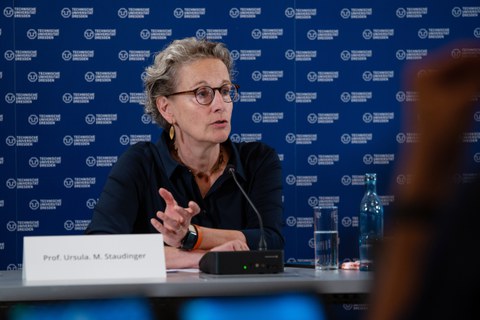Jul 21, 2020
TU Dresden on its way towards becoming the global university of the 21st century / Interdisciplinarity on equal footing
"The most important goal of my five-year term is to defend the Excellence Status of TU Dresden and thus secure the future development of our university. The further development of structures and incentives to support interdisciplinarity on a broad spectrum and on equal footing, as well as the trusted and deepened collaboration in the DRESDEN-concept network, is an essential starting point for our work in the coming years," said Professor Ursula M. Staudinger at her inaugural press conference. The basis for successful applications for Clusters of Excellence shall be created spanning all five research priority areas of TU Dresden (https://tu-dresden.de/forschung-transfer/forschungsprofil/forschungsprofillinien?set_language=en).
Tomorrow, on 18th August, Professor Ursula M. Staudinger will take over as Rector of TU Dresden. Over the past few months, she has put together her team of Vice-Rectors and held numerous meetings to ensure the implementation of her objectives from day one.
For Professor Staudinger, an excellent university distinguishes itself strongly, among other things, as a modern employer harnessing a culture of appreciation and transparency, and is characterised by efficient structures and processes. At the same time, she intends to capitalise on the opportunities and therefore to expand digitisation and diversity at TU Dresden.
"Of course," says Professor Staudinger, "excellent research must go hand in hand with excellent teaching and education. In the coming years, teaching at TU Dresden will offer innovative, hybrid forms of learning and examination, attractive degrees and syllabi, alongside a strong research orientation and internationalisation.”
"We will strive to develop TU Dresden to become a global university for the 21st century and I consider the 200th anniversary in 2028 as an important milestone in this process." For TU Dresden, this means increased worldwide visibility, the educational formation of world citizens, and excellent research that will allow TU Dresden to make important contributions to mastering the challenges of humanity locally as well as globally. "The attractiveness of our university for national and international students of a wide spectrum of ages is growing. This will not only be reflected in the number of applications, but also in the positive feedback we will receive in satisfaction surveys."
Professor Staudinger also underlines the importance of TU Dresden for various areas of society: "TU Dresden can make decisive contributions to mastering the global challenges facing humanity and further expand its role as an important social player. In this way, we can contribute to the well-being of the people in Saxony - especially in Dresden - and fulfil our role as an engine of innovation and growth for Saxony."
The strengthening of broad and levelled interdisciplinarity and our responsibility for society will become visible for everyone through the Project House Future, which will be used equally by faculty, students, and for collaborations with the urban society, as this was set out in the successful Excellence proposal. The opening needs to happen for the 200th anniversary of our university in 2028.
For the work of the new University Executive Board, Professor Staudinger is counting on the continued support of the state government: "I assume that the Free State of Saxony will continue to support us on our path and thus contribute to our success in the next round of the Excellence Strategy. We will, in turn, make significant contributions to the productivity and sustainability of the Free State of Saxony."
To be able to successfully implement all these objectives over the next five years, Professor Staudinger has expanded the University Executive Board, and restructured the members’ responsibilities.
- Rector: Prof. Dr. Ursula M. Staudinger
- Chancellor: Dr. Andreas Handschuh
- Chief Officer Digitalisation and Information: Prof. Dr. Lars Bernard
- Vice-Rector University Culture: Prof. Dr. Roswitha Böhm
- Vice-Rector Academic Affairs: Prof. Dr. Gerald Gerlach
- Vice-Rector Research: Prof. Dr. Angela Rösen-Wolff
- Chief Officer Technology Transfer and Internationalisation: Prof. Dr. Ronald Tetzlaff
The Department for University Culture is unique in Germany (if not worldwide) and will be dedicated to the work in the four areas of diversity and integration, work-life balance, campus life, and TU Dresden as a civil agent.
For all challenges, Professor Staudinger relies on team spirit and collaboration with all members of the university: "I am sure that we, the University Executive Board, will closely cooperate to pursue and achieve the aforementioned objectives. A decisive factor for us is the involvement of all members of the university (faculty, employees and students) I trust in the often quoted Dresden spirit, of which I have been convinced first-hand in the past few weeks.“
Media inquiries:
Kim-Astrid Magister
Tel.: 0351 463-32398
At her introductory press conference, Professor Ursula M. Staudinger shares her vision and aims for TU Dresden. © TU Dresden

